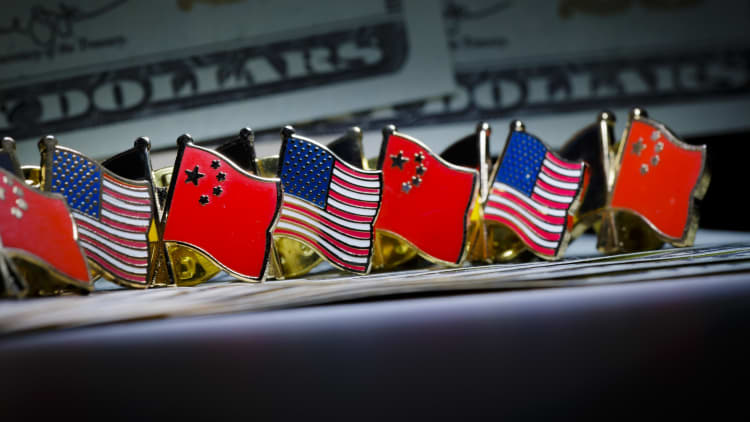
Stocks fell sharply on Thursday as investors started to fear the U.S.-China trade war is slowing the economy.
The Dow Jones Industrial Average fell 286.14 points to 25,490.47 as United Technologies lagged. The fell 1.2% to 2,822.24 while the Nasdaq Composite dropped 1.6% to 7,628.28. The Dow fell more than 400 points at its lows, but regained some of its losses in the final hour of trading as Intel shares turned around to close 1.2% higher.
The Dow is now down more than 380 points in two days as Wall Street begins to realize the trade war may last a lot longer than previously expected. Bond yields and crude oil also plunged on Thursday as the rising risk spread through other markets. The 10-year yield fell to its lowest since October 2017. The S&P 500 is down more than 4% so far in May along with the Dow.
"The trade landscape looks bleaker than ever," said Adam Crisafulli, executive director at J.P. Morgan, in a note. "Anyone bullish on the SPX has to be conducting a lot of soul searching at the moment."
Crisafulli also pointed out that data from around the world is indicating an economic rebound from earlier this year is "showing signs of attenuating" while the Federal Reserve is in no hurry to cut rates.
IHS Markit said on Thursday that U.S. manufacturing activity grew at its slowest pace since September 2009 this month. The data led investors to load up on Treasurys.
As yields fell on the weak economic data, bank shares including J.P. Morgan Chase and Bank of America were hit.
Shares of Apple, hit hard this month on trade war fears, fell another 1.7% after a UBS analyst cut his price target on the iPhone maker to $225 per share from $235. The analyst kept his buy rating on the stock, but noted that "a slightly lower multiple is prudent given soft smartphone market and ongoing US/China trade issues."
Shares of Qualcomm fell 1.5% while Xilinx closed 2.3% lower. Micron Technology and Lam Research declined 2.6% and 0.9%, respectively.
"Long term, six-to-12 months, this won't derail the bull market. A lot of this rests on what the Fed is going to do and they have not given any indication they will raise rates," said John Davi, chief investment officer at Astoria Portfolio Advisors. But "given how fast we rallied over the past four months … between valuations becoming a little bit stretched, trade wars and how fast we came back, it's kind of hard to see a meaningful rally from these levels."
U.K.-based chip designer Arm Holdings said it suspended business with Chinese telecom giant Huawei to comply with the U.S. blacklisting of the telecom company. Panasonic also said it stopped shipping some smartphone components to Huawei. Vodafone and BT Group, the biggest phone carriers in the U.K., said they are removing Huawei phones from their 5G network plans.
At the same time, China is taking a stronger tone in its rhetoric towards the U.S. Ministry of Commerce spokesperson Gao Feng said: "If the U.S. would like to keep on negotiating it should, with sincerity, adjust its wrong actions. Only then can talks continue."
"The U.S. ... crackdown on Chinese companies not only seriously damages the normal commercial cooperation between both countries, but it also forms a great threat to the security of the global industrial and supply chain," Feng added.
U.S. Secretary of State Mike Pompeo told CNBC's "Squawk Box" on Thursday that "it is important for the conversation to continue." He also said Huawei works with the Chinese government even though the company has denied such claims. "For them to say that they don't work with the Chinese government is false."
The U.S. and China have imposed tariffs on billions of dollars' worth of one another's goods since the start of 2018, battering financial markets and souring business and consumer sentiment. Tensions ratcheted up earlier this month with both sides hiking tariffs on their goods.
—CNBC's Sam Meredith contributed to this report.


